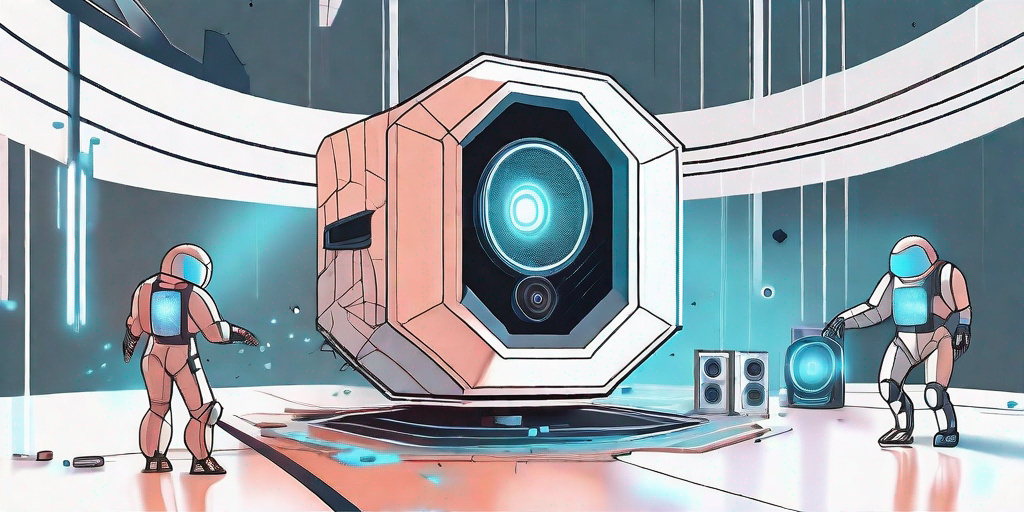Understanding Nanotechnology with Help from a Futurist Speaker

Understanding Nanotechnology with Help from a Futurist Speaker
Welcome to the fascinating world of nanotechnology, where the seemingly impossible becomes possible. In this article, we will explore the basics of nanotechnology and how it is demystified by a futurist speaker. We'll also delve into the predictions and possibilities for the future of nanotechnology and its practical applications in everyday life. So, buckle up and prepare to be amazed!
Understanding Nanotechnology: The Basics
Before we dive into the intricacies of nanotechnology, let's start with the basics. Nanotechnology is the science, engineering, and application of materials and devices at the nanoscale, typically in the range of one to 100 nanometers. To put that into perspective, a nanometer is one billionth of a meter! At this tiny scale, the laws of physics and chemistry behave differently, leading to unique properties and capabilities.
Nanotechnology encompasses various fields, including physics, chemistry, biology, materials science, and engineering. It involves the manipulation and control of atoms and molecules to create new structures, materials, and devices with enhanced properties. Think of it as building with Legos, but on an atomic scale.
One of the most fascinating aspects of nanotechnology is its interdisciplinary nature. It brings together scientists and engineers from different fields to collaborate and push the boundaries of what is possible. For example, physicists study the quantum effects that occur at the nanoscale, while chemists develop new methods to synthesize nanomaterials with precise control over their properties.
Furthermore, nanotechnology has a wide range of applications across various industries. In medicine, nanotechnology is revolutionizing drug delivery systems, enabling targeted therapies that can selectively deliver medications to specific cells or tissues. This precise targeting reduces side effects and improves treatment outcomes.
In electronics, nanotechnology has led to the development of smaller, faster, and more efficient devices. By manipulating materials at the nanoscale, researchers have been able to create transistors and other components with improved performance and reduced power consumption. This has paved the way for advancements in computing, telecommunications, and renewable energy.
Another exciting area of nanotechnology is nanomaterials. These are materials with unique properties that arise from their nanoscale dimensions. For example, carbon nanotubes are incredibly strong and have high electrical conductivity, making them ideal for applications in electronics and aerospace. Nanoparticles, on the other hand, can be engineered to have specific optical, magnetic, or catalytic properties, opening up possibilities in sensors, imaging, and environmental remediation.
As nanotechnology continues to evolve, researchers are exploring new frontiers and pushing the boundaries of what is possible. They are investigating novel nanomaterials, such as graphene, which has exceptional strength and conductivity, and exploring the potential of nanorobotics for targeted drug delivery and precision manufacturing.
In conclusion, nanotechnology is a fascinating field that offers endless possibilities for scientific discovery and technological advancements. By understanding the basics of nanotechnology and its interdisciplinary nature, we can appreciate the transformative impact it has on various industries and our everyday lives.
The Role of a Futurist Speaker in Demystifying Nanotechnology
Nanotechnology can be an intimidating subject for many people. The mere mention of the word "nanotechnology" can conjure up images of complex scientific theories and microscopic machines. However, understanding this cutting-edge field doesn't have to be a daunting task. That's where a futurist speaker comes in.
These visionary individuals possess a unique skill set that allows them to act as guides, bringing clarity and understanding to complex scientific concepts like nanotechnology. They have a deep understanding of the subject matter and are able to communicate it in a way that resonates with a diverse audience.
A futurist speaker excels at breaking down complicated ideas into digestible pieces of information, making it accessible to a broader audience. They have a knack for simplifying complex scientific theories without oversimplifying them. By carefully selecting the most relevant and intriguing aspects of nanotechnology, they are able to create a narrative that captivates their listeners.
One of the most powerful tools in a futurist speaker's arsenal is storytelling. They understand that humans are wired to respond to stories, and they use this to their advantage. By weaving compelling narratives around nanotechnology, they are able to engage their audience on an emotional level, making the subject matter more relatable and memorable.
Metaphors and analogies are also key tools in a futurist speaker's toolbox. They use these linguistic devices to bridge the gap between scientific jargon and everyday language. By comparing complex nanoscale processes to familiar objects or phenomena, they make the abstract tangible. This allows their listeners to grasp the fundamental concepts of nanotechnology without getting lost in a sea of technical terms.
Furthermore, a futurist speaker doesn't just focus on the scientific aspects of nanotechnology. They also delve into its broader implications and impact on society. They explore how nanotechnology is revolutionizing various industries, from healthcare and electronics to energy and manufacturing. By highlighting real-world examples and case studies, they demonstrate the practical applications of nanotechnology and its potential to shape our future.
By demystifying nanotechnology, futurist speakers play a crucial role in helping us comprehend its significance and its impact on our lives. They empower us to embrace this rapidly advancing field and inspire us to explore the possibilities it holds. Whether it's through captivating storytelling, relatable metaphors, or thought-provoking examples, futurist speakers are instrumental in making nanotechnology accessible to all.
The Future of Nanotechnology: Predictions and Possibilities
Looking ahead, the future of nanotechnology is filled with incredible possibilities. Experts predict that nanotechnology will revolutionize various industries, from healthcare and electronics to energy and manufacturing. With nanomaterials, we may develop super-strong and lightweight materials, capable of building more efficient vehicles and structures.
Nanomedicine holds tremendous potential too. Imagine personalized treatments that target cancer cells while leaving healthy cells unharmed, or nanorobots repairing damaged tissue from within the human body. These are just a glimpse of the possibilities nanotechnology offers in the realm of healthcare.
Moreover, nanotechnology opens doors to renewable energy solutions, such as highly efficient solar panels and advanced batteries with increased storage capacity. It may even pave the way for new computing technologies, as transistors continue to shrink in size, leading to faster and more powerful computers.
When it comes to the manufacturing industry, nanotechnology has the potential to revolutionize the production process. With nanoscale materials and devices, manufacturers can create products with enhanced properties and functionalities. For example, nanotechnology can be used to develop self-cleaning surfaces, where nanoparticles repel dirt and prevent the growth of bacteria. This could have significant implications for industries such as healthcare, food processing, and transportation.
In the field of electronics, nanotechnology is expected to bring about major advancements. As transistors continue to shrink in size, nanoscale materials and devices will play a crucial role in the development of smaller, faster, and more energy-efficient electronic devices. Nanotechnology also holds promise for flexible electronics, where nanoscale materials can be integrated into flexible substrates, enabling the creation of bendable and wearable devices.
Furthermore, nanotechnology has the potential to revolutionize the field of agriculture. By developing nanoscale sensors and delivery systems, farmers can monitor and optimize crop growth, leading to increased yields and reduced environmental impact. Nanotechnology can also be used to develop smart packaging materials that can detect and prevent spoilage, ensuring food safety and reducing food waste.
Another exciting area where nanotechnology is making significant strides is in environmental remediation. Nanomaterials can be used to remove pollutants from water and air, offering a sustainable solution to address environmental challenges. For example, nanoparticles can be designed to selectively adsorb heavy metals from contaminated water sources, providing a cost-effective and efficient method for water purification.
As the field of nanotechnology continues to advance, researchers are also exploring the potential ethical and societal implications of this technology. It is important to consider the potential risks and benefits associated with the widespread adoption of nanotechnology, and to ensure that proper regulations and safety measures are in place to protect both human health and the environment.
In conclusion, the future of nanotechnology is incredibly promising. From healthcare and electronics to energy and manufacturing, nanotechnology has the potential to revolutionize various industries and improve our quality of life. As researchers continue to push the boundaries of what is possible at the nanoscale, we can look forward to a future where nanotechnology plays a pivotal role in shaping our world.
How a Futurist Speaker Translates Complex Science into Understandable Concepts
Now, you might wonder how a futurist speaker accomplishes the seemingly impossible task of translating complex science into understandable concepts. Well, these skilled communicators possess an innate ability to make connections and find common ground between scientific principles and everyday experiences.
They craft narratives that draw parallels between nanotechnology and familiar objects or processes. For example, they might compare the self-assembly of nanomaterials to the way bricks are arranged to build a house. This relatable analogy helps us grasp the fundamental concept of nanoscale assembly without getting lost in technicalities.
Furthermore, futurist speakers use visual aids, interactive demonstrations, and even humor to engage their audience. They understand that learning is most effective when it is enjoyable, so they sprinkle their presentations with intelligent humor and captivating visuals that leave a lasting impact.
Practical Applications: How Nanotechnology Will Impact Everyday Life
Now, let's turn our attention to the practical applications of nanotechnology in everyday life. Although nanoscale devices and products are not yet ubiquitous, they have the potential to revolutionize various aspects of our lives.
In electronics, nanotechnology is already enabling the development of smaller, faster, and more energy-efficient devices. This means that our smartphones, computers, and wearables will continue to become increasingly powerful and portable.
In the field of healthcare, nanotechnology is poised to bring significant advancements. From targeted drug delivery systems to diagnostics and imaging techniques, nanomedicine aims to improve patient outcomes and enhance the precision of medical treatments.
Additionally, nanotechnology may play a crucial role in solving environmental challenges. By designing more efficient solar cells and developing advanced filtration systems, we can harness clean energy and ensure access to clean water for all.
As we move forward, the collaboration between scientists, engineers, and futurist speakers will be instrumental in unlocking the full potential of nanotechnology and ensuring its responsible and ethical development.
Conclusion
Understanding the complex world of nanotechnology can be daunting, but with the help of futurist speakers, we can demystify this incredible field of science. By breaking down technical concepts into relatable terms, they bridge the gap between scientists and the general public, opening doors to endless possibilities.
Nanotechnology is not just a buzzword; it is a catalyst for innovation and progress. As we continue to explore its applications, we must approach its development with caution, ensuring that the benefits outweigh the risks.
So, the next time you hear about nanotechnology, remember the futurist speakers who strive to make this fascinating realm accessible to all. Together, we can embrace the future of nanotechnology and its potential to reshape our world.
Frequently Asked Questions
What is nanotechnology?
Nanotechnology is the science, engineering, and application of materials and devices at the nanoscale, typically in the range of one to 100 nanometers. It involves manipulating and controlling atoms and molecules to create new structures, materials, and devices with enhanced properties.
How does nanotechnology impact everyday life?
Nanotechnology has a wide range of applications in various industries. It is revolutionizing drug delivery systems in medicine, leading to targeted therapies with reduced side effects. In electronics, nanotechnology has enabled the development of smaller, faster, and more efficient devices. It also holds promise in renewable energy, manufacturing, agriculture, and environmental remediation.
What is the role of a futurist speaker in demystifying nanotechnology?
A futurist speaker plays a crucial role in making complex scientific concepts like nanotechnology accessible to a broader audience. They simplify and explain the subject matter through storytelling, metaphors, and relatable examples. They also highlight the practical applications and impact of nanotechnology in various industries, helping people understand its significance and potential.
Contact a Futurist Speaker for Your Event
After reading about the fascinating world of nanotechnology and the role of a futurist speaker in demystifying complex scientific concepts, wouldn't it be exciting to have Dr Mark van Rijmenam, a renowned futurist speaker, at your next event? Imagine your audience being captivated by his engaging narratives, relatable metaphors, and thought-provoking examples. Dr van Rijmenam is not just a speaker; he is a visionary who can guide your audience through the intricacies of nanotechnology and its potential impact on various industries. If you're ready to take your event to the next level, simply complete the form below. We will be in touch within 24 hours to discuss how Dr van Rijmenam can make your event an unforgettable experience.
Thanks for your inquiry
We have sent you a copy of your request and we will be in touch within 24 hours on business days.
If you do not receive an email from us by then, please check your spam mailbox and whitelist email addresses from @thedigitalspeaker.com.
In the meantime, feel free to learn more about The Digital Speaker here.
Or read The Digital Speaker's latest articles here.





